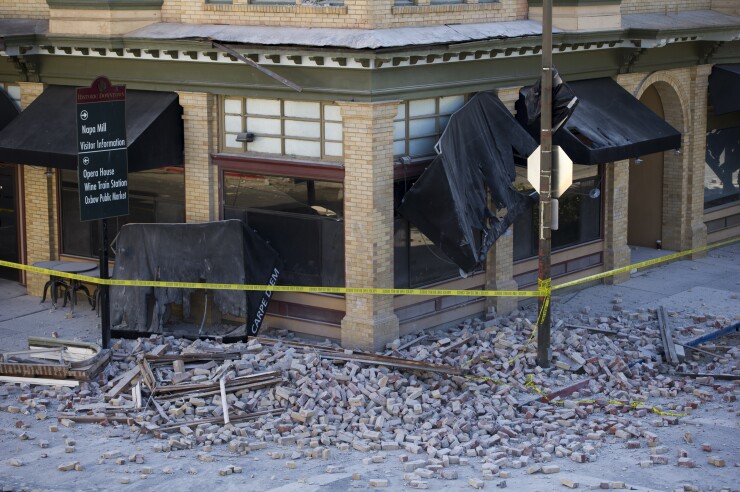The state-managed earthquake insurer for homeowners in California is borrowing in the public debt markets in lieu of paying for additional coverage that would shield it against risks.
The California Earthquake Authority plans to price $250 million of short-term debt Tuesday, according to an online investor presentation. The notes, maturing in November, are backed by policy premiums and the proceeds will be used to bolster the insurer's funds earmarked to repay claims, according to the preliminary official statement.
The short-term sale is an unusual maneuver that would allow the CEA to temporarily lower the amount of available capital on its balance sheet. At the end of March, the organization had $20.5 billion in funds to pay claims, including $6.2 billion in available capital and $1.7 billion from partnering insurance companies. These insurers can reduce their payments if the CEA's available capital exceeds $6 billion for more than six months.

If that happens, CEA would have to fill the gap by getting more reinsurance, which it wants to avoid to keep costs down for the state's homeowners. Prices for U.S. property catastrophe reinsurance have doubled between 2018 and 2023, according to a National Bureau of Economic Research
The CEA was formed after the 6.7 magnitude Northridge earthquake shook Southern California in 1994, leaving 57 people dead and thousands injured. Because of the damage, in the year following the quake, most insurers ceased offering new residential policies in the area, hurting the state's real estate market. The authority offers basic, residential property insurance to homeowners in California.
The authority estimates the upcoming debt issuance will save it about $17 million, according to
The insurer plans to pre-fund an account that it will use for debt payments, while the equivalent amount it's borrowing from investors will go toward paying claims. This gambit keeps the CEA's capacity to pay claims the same — but its available capital shrinks by $250 million for the next four months.
The move is a "unique workaround," said Fitch Ratings' primary analyst, Christopher Grimes.
"They have a mandate to provide coverage and to make it as affordable as they can for homeowners in California who want to insure earthquake risk. So that's part of the challenge — having the capital available to them but not doing it in a way that costs too much," he said in a phone interview. "It's that balancing act."
A representative for JPMorgan, the lead underwriter of the deal, declined to comment.
The CEA has used this maneuver in the past and some of its insurance partners are pushing back.
Trudy Moore, a representative from United Services Automobile Association, urged the CEA board to reject the proposal in a June meeting.
"The artificial suppression of the CEA's available capital has gone on long enough," she said in the meeting.
At the June board meeting, board member and State Insurance Commissioner
Fitch rated the new bonds F1-plus, its best credit rating for short-term securities.
"From an investor's perspective, it's even safer than what you'd traditionally see with one of the revenue bonds because that money is already in the account," said Grimes.





